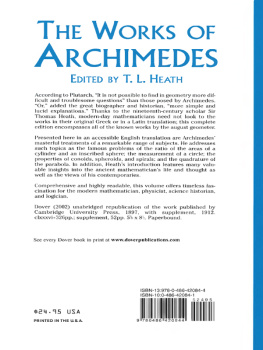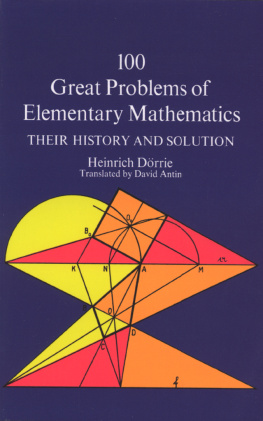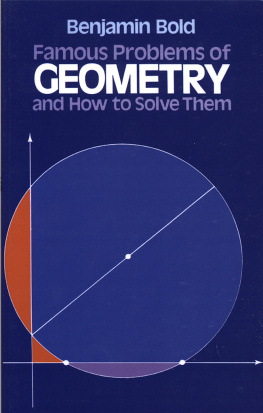T HE W ORKS OF
ARCHIMEDES
Edited By T.L. Heath
DOVER PUBLICATIONS, INC.
Mineola, New York
Bibliographical Note
This Dover edition, first published in 2002, is an unabridged republication of the edition published by Cambridge University Press in 1897 under the title The Works of Archimedes, Edited in Modern Notation with Introductory Chapters, and of the supplement published by Cambridge University Press in 1912 under the title The Method of Archimedes, Recently Discovered by Heiberg. A Supplement to The Works of Archimedes.
In this edition, there are no pages i-ii in the front matter or 12 in the Supplement. Front matter text begins with the Preface, p.v., and the Supplement text begins with the Introductory Note, p. 5. No material has been omitted.
Library of Congress Cataloging-in-Publication Data
Archimedes.
[Works. English. 2002]
The works of Archimedes / Archimedes; T.L. Health, ed.
p. cm.
Unabridged republication of the edition published by Cambridge University Press in 1897 under the title The works of Archimedes, edited in modern notation with introductory chapters, and of the supplement published by Cambridge University Press in 1912 under the title The method of Archimedes, recently discovered by Heiberg, a supplement to The works of Archimedes"T.p. verso.
Includes bibliographical references.
ISBN 0-486-42084-1(pbk.)
1. Mathematics, Greek. 2. GeometryEarly works to 1800. 3. Mechanics Early works to 1800. I. Heath, Thomas Little, Sir, 18611940. II. Title.
QA31 .A692 2002
510dc21
2002018892
Manufactured in the United States of America
Dover Publications, Inc., 31 East 2nd Street, Mineola, N.Y. 11501
PREFACE.
T HIS book is intended to form a companion volume to my edition of the treatise of Apollonius on Conic Sections lately published. If it was worth while to attempt to make the work of the great geometer accessible to the mathematician of to-day who might not be able, in consequence of its length and of its form, either to read it in the original Greek or in a Latin translation, or, having read it, to master it and grasp the whole scheme of the treatise, I feel that I owe even less of an apology for offering to the public a reproduction, on the same lines, of the extant works of perhaps the greatest mathematical genius that the world has ever seen.
Michel Chasles has drawn an instimctive distinction between the predominant features of the geometry of Archimedes and of the geometry which we find so highly developed in Apollonius. Their works may be regarded, says Chasles, as the origin and basis of two great inquiries which seem to share between them the domain of geometry. Apollonius is concerned with the Geometry of Forms and Situations, while in Archimedes we find the Geometry of Measurements dealing with the quadrature of curvilinear plane figures and with the quadrature and cubature of curved surfaces, investigations which gave birth to the calculus of the infinite conceived and brought to perfection successively by Kepler, Cavalieri, Fermat, Leibniz, and Newton. But whether Archimedes is viewed as the man who, with the limited means at his disposal, nevertheless succeeded in performing what are really integrations for the purpose of finding the area of a parabolic segment and a spiral, the surface and volume of a sphere and a segment of a sphere, and the volume of any segments of the solids of revolution of the second degree, whether he is seen finding the centre of gravity of a parabolic segment, calculating arithmetical approximations to the value of , inventing a system for expressing in words any number up to that which we should write down with 1 followed by 80,000 billion ciphers, or inventing the whole science of hydrostatics and at the same time carrying it so far as to give a most complete investigation of the positions of rest and stability of a right segment of a paraboloid of revolution floating in a fluid, the intelligent reader cannot fail to be struck by the remarkable range of subjects and the mastery of treatment. And if these are such as to create genuine enthusiasm in the student of Archimedes, the style and method are no less irresistibly attractive. One feature which will probably most impress the mathematician accustomed to the rapidity and directness secured by the generality of modem methods is the deliberation with which Archimedes approaches the solution of any one of his main problems. Yet this very characteristic, with its incidental effects, is calculated to excite the more admiration because the method suggests the tactics of some great strategist who foresees everything, eliminates everything not immediately conducive to the execution of his plan, masters every position in its order, and then suddenly (when the very elaboration of the scheme has almost obscured, in the mind of the spectator, its ultimate object) strikes the final blow. Thus we read in Archimedes proposition after proposition the bearing of which is not immediately obvious but which we find infallibly used later on; and we are led on by such easy stages that the difficulty of the original problem, as presented at the outset, is scarcely appreciated. As Plutarch says, it is not possible to find in geometry more difficult and troublesome questions, or more simple and lucid explanations. But it is decidedly a rhetorical exaggeration when Plutarch goes on to say that we are deceived by the easiness of the successive steps into the belief that anyone could have discovered them for himself. On the contrary, the studied simplicity and the perfect finish of the treatises involve at the same time an element of mystery. Though each step depends upon the preceding ones, we are left in the dark as to how they were suggested to Archimedes. There is, in fact, much truth in a remark of Wallis to the effect that he seems as it were of set purpose to have covered up the traces of his investigation as if he had grudged posterity the secret of his method of inquiry while he wished to extort from them assent to his results. Wallis adds with equal reason that not only Archimedes but nearly all the ancients so hid away from posterity their method of Analysis (though it is certain that they had one) that more modem mathematicians found it easier to invent a new Analysis than to seek out the old. This is no doubt the reason why Archimedes and other Greek geometers have received so little attention during the present century and why Archimedes is for the most part only vaguely remembered as the inventor of a screw, while even mathematicians scarcely know him except as the discoverer of the principle in hydrostatics which bears his name. It is only of recent years that we have had a satisfactory edition of the Greek text, that of Heiberg brought out in 1880-1, and I know of no complete translation since the German one of Nizze, published in 1824, which is now out of print and so rare that I had some difficulty in procuring a copy.
The plan of this work is then the same as that which I followed in editing the Conics of Apollonius. In this case, however, there has been less need as well as less opportunity for compression, and it has been possible to retain the numbering of the propositions and to enunciate them in a manner more nearly approaching the original without thereby making the enunciations obscure. Moreover, the subject matter is not so complicated as to necessitate absolute uniformity in the notation used (which is the only means whereby Apollonius can be made even tolerably readable), though I have tried to secure as much uniformity as was fairly possible. My main object has been to present a perfectly faithful reproduction of the treatises as they have come down to us, neither adding anything nor leaving out anything essential or important. The notes are for the most part intended to throw light on particular points in the text or to supply proofs of propositions assumed by Archimedes as known; sometimes I have thought it right to insert within square brackets after certain propositions, and in the same type, notes designed to bring out the exact significance of those propositions, in cases where to place such notes in the Introduction or at the bottom of the page might lead to their being overlooked.
Next page








